CPR (cardiopulmonary resuscitation) is pushing down on a person's chest and breathing into their mouth. It's used in emergencies when someone's heart stops beating or when someone is not breathing normally (may be gasping for breath) or is not breathing at all.
Most children never need rescue breathing or CPR. But if they do, the best thing you can do is be prepared. Talk to your doctor or take a class to learn how to do rescue breathing and CPR, and then use these instructions as a reference.
Automated external defibrillators (AEDs) are in many public places. Before you use an AED, follow all the steps for CPR.
To use an AED, place it next to the child and turn it on. The AED will tell you what to do next.
How to give CPR to children
Talk to your doctor or take a class to learn how to do CPR, and then use these instructions as a reference. You may need to use an automated external defibrillator (AED). An AED is a machine that can correct a person’s heart rhythm. The AED will tell you how to use it.
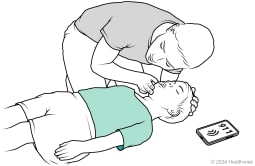
- Tap the child and shout their name. Look for signs of breathing. If the child isn’t breathing, call 911, or ask someone else to call.
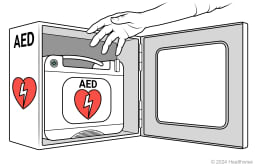
2. If there's an AED nearby, ask someone to go get it.
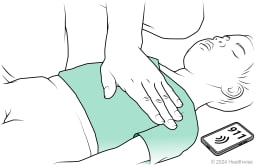
3. Start CPR. Imagine a line between the child's nipples. Place the heel of one hand just below that line on the lower half of the breastbone.
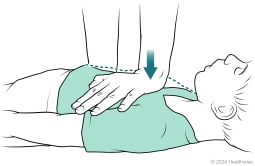
4. Push hard and fast. Give 30 compressions at a rate of about 2 compressions per second. Compress the chest about one-third of the way or about 2 inches. If the child is large, you may need to stack your hands on top of each other.
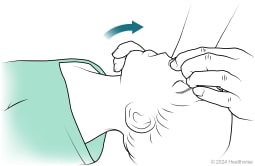
5. Take a breath. Gently tilt the child’s head back and pinch their nose. Seal your mouth over their mouth.
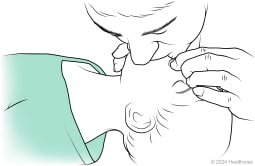
6. Blow one breath into the child’s mouth. Let the chest fall and give a second breath.

7. Restart chest compressions right away.
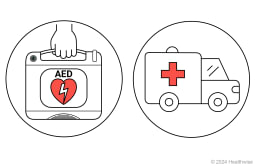
8. Keep giving sets of 30 compressions and 2 rescue breaths until help arrives, the child is breathing normally, or an AED is ready to use.
Where can you learn more?
Go to http://www.healthwise.net/patientEd
Enter K315 in the search box to learn more about "Learning About How to Give CPR to Children".
Current as of: October 1, 2025
Author: Ignite Healthwise, LLC Staff
Clinical Review Board
All Ignite Healthwise, LLC education is reviewed by a team that includes physicians, nurses, advanced practitioners, registered dieticians, and other healthcare professionals.

